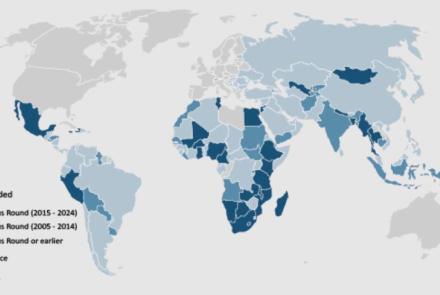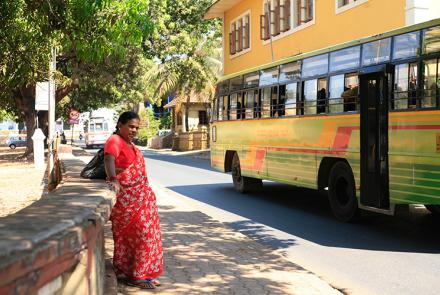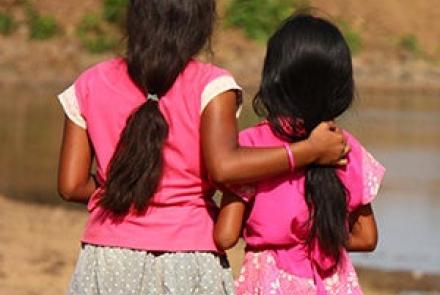WEDGE Affiliates
Our WEDGE affiliate program is designed to bring scholars studying the various aspects of women's empowerment together to build a network of scholars, maintain a directory of current projects and create a bibliography of innovative publications
|
Name |
Institution |
Bio |
Photo |
|
Ashwini Deshpande |
Ashoka University, Professor of Economics |
Dr. Deshpande’s Ph.D. and early publications have been on the international debt crisis of the 1980s. Subsequently, she has been working on the economics of discrimination and affirmative action, with a focus on caste and gender in India. |
|
|
Dhiman Das |
Independent Scholar |
Dhiman Das's research focuses on several areas of public policy in developed and developing countries. His research in developed countries examined the effect of changes in public programs on institutions and individuals, health behaviors among immigrants and youth, among other topics. In his research on developing countries, he has studied women’s agency and its implications, issues of poverty, and work in old age, and effect of climate change on rural livelihood. He received his Ph.D. in Economics from the CUNY Graduate Center, NY, and M.Phil. in Economics from the Jawaharlal Nehru University in India.
|
|
|
Esha Chatterjee |
IIT Kanpur, Asst. Professor of Humanities and Social Science |
Esha Chatterjee is starting as an Assistant Professor in Humanities and Social Science at the Indian Institute of Technology (IIT) Kanpur. She has completed her doctorate in Sociology from the University of Maryland, College Park in Summer 2020. She has obtained a M.Phil and Masters in Economics from Jadavpur University, India. Her primary research interests are in the fields of demography and gender,work and family. Her past and ongoing projects examine the relationship between women’s employment and education; fertility intentions, behaviour and maternal health, unmet need for contraception, and internal migration in the Indian context. |
|
|
Mary Ng’endo Kanui |
International Rice Research Institute (IRRI) |
Dr Mary Ng’endo Kanui is a Systems Scientist with expertise on gender and agriculture, nutrition-agriculture-climate linkages, multiple models of sustainable agriculture (such as agrobiodiversity, agroforestry and conservation agriculture) and rural development. Currently, she is working as a gender and youth specialist at the International Rice Research Institute (IRRI) in both Tanzania and Kenya. |
|
|
Esther M. Njugna |
CGIAR |
Esther Njugna is a social scientist, working as the Gender Specialist in the CGIAR Research Program on Grain Legumes and Dryland cereals. Her research interests include gender dynamics in seed systems, Gender Yield Gap in legume production, Women participation in agricultural capacity building; interface between gender. She has been working with male and female smallholder farmers since 1996. She is a graduate of Wageningen University and Research Centre (Agricultural Development - Msc) and University of Nairobi-(Agricultural Development and Economics) – PhD. She has extensive experience in capacity development for women in agri-food systems. |
|
|
Khadijat B. Amolegbe
|
University of Ilorin, Nigeria
|
Khadijat B. Amolegbe holds a PhD in Agricultural Economics. She has held research fellowship positions at international institutions such as the International Institute of Tropical Agriculture (IITA) and Nordic Africa Institute, Sweden. She was also a research fellow at Dyson School of Applied Economics and Management, Cornell University, under the Structural Transformation of African Agriculture and Rural Spaces (STAARS) fellowship program. Her research straddles agricultural development economics, food security, and poverty and inequality issues in sub-Saharan Africa, and she has published more than ten peer-reviewed journal articles. |
|
|
Jean Lee |
Office of the Chief Economist, South Asia Region, World Bank |
Jean Lee is a Senior Economist in the Office of the Chief Economist for the South Asia Region. She received a doctorate in economics from Harvard University in 2010 and a bachelor's degree in physics from Harvard University in 2003. Her research interests are diverse and include a broad set of topics and both experimental and nonexperimental work in development economics and selected areas of domestic policy. She has work and research experience in Kenya, Zambia, Bangladesh, Uganda, Vietnam, Indonesia, Sri Lanka, Malawi and Burkina Faso and is currently starting new work in India, Nepal and Pakistan. |
|
|
Lei Lei |
Rutgers University |
Lei Lei is an Assistant Professor of sociology at Rutgers University. She studies social determinants of health, family dynamics, and social inequality in different societies. One line of her research seeks to understand how social factors, such as residential contexts, working conditions, family dynamics, and gender roles, get under the skin to produce and perpetuate health inequalities. Another strand of her research investigates the determinants and consequences of young adults’ prolonged co- residence with parents. |
|
|
Mehr Manzoor |
Tulane University |
Mehr Manzoor is a Fulbright Scholar from Pakistan and a Ph.D. candidate at Tulane University in the department of Health Policy and Management. Mehr’s research focuses on gender equality and women’s leadership in global health. She served as a research director at Women in Global Health from 2016-2019 as a volunteer. In 2018, Mehr was selected as an Emerging Voice for Global Health (EV4GH) Program. She is a lead author on the first ever technical report “Delivered by women, led by men: A Gender and Equity analysis in the Global Health and Social Care Workforce” published by World Health Organization. |
|
|
Ran Liu |
Asst. Professor Educational Policy Studies, Univ. of Wisconsin-Madison |
Ran Liu is an Assistant Professor in the Department of Educational Policy Studies. Her research examines cross-national differences in gender inequality in STEM education, with a particular focus on East Asian societies. More broadly, she studies the intersection of race, gender, class, and immigration status in education and the labor market. Ran received her PhD in sociology from the University of Pennsylvania. Deeply concerned with the underrepresentation of women in STEM fields, she founded Women in Kaggle Philly and organized workshops for women who are interested in data science to provide a supportive environment. Before coming to UW-Madison, she worked as a people research scientist at Facebook on diversity issues. |
|
|
Kriti Vikram |
Assistant Professor, Sociology, National University of Singapore |
Kriti Vikram received her PhD from the University of Maryland in 2015. Her research centres on the social determinants of health and cognitive achievement of children in India. One stream of her research focuses on the intergenerational transfer of (dis)advantage in health and cognitive development. These include a series of papers that document how parental resources influence the health and cognitive development of children in India. The second line of work evaluates the role of governmental intervention in children's development in India. The third strand focuses on women's health, fertility, and contraceptive use in developing countries. She has published in journals such as Demography, World Development, Health & Place and International Migration Review amongst others. For more information, please check: https://profile.nus.edu.sg/fass/socvk/ |
|
|
Lilian Nkengla |
Senior Advisor for Agriculture and Markets, Oxfam America |
Lilian Nkengla’s work is focused on agricultural value chains, market-based programming and climate resilience especially for smallholder farmers in Sub Saharan Africa and Asia. She provides technical support to country programs and works with several actors and facilitates coordination and linkages to markets for a more sustainable rural economy. She is the focal point on gender for the Food and Climate Justice sub-theme of the Inclusive and Resilient Food Systems Theme at Oxfam. Prior to joining Oxfam, Lilian worked as a Gender Scientist in the CGIAR Research Program on Grain Legumes and Dryland cereals and CGIAR Research Program on Roots and Tubers (RTB) at International Crops Research Institute for Semi-Arid Tropics (ICRISAT), Bamako and International Institute of Tropical Agriculture (IITA), Cameroon respectively. Research interests include gender-responsive breeding, agricultural value chains, climate resilience and seed systems-related research. She is a fellow and Sub-Saharan Gender Specialist with Gender-responsive Researchers Equipped for Agricultural Transformation (GREAT) with Universities of Cornell, USA and Makerere, Uganda. Lilian holds a PhD in Gender and Natural Resource Management from Brandenburg University of Technology, Germany. |
|
|
Katrina Kosec |
Senior Research Fellow, Development Strategy and Governance Division at IFPRI; Theme Leader for Public Investment |
Katrina Kosec is also an adjunct professor at Johns Hopkins University. Her research focuses on the linkages between governance, public investment, gender, and economic shocks. One strand of work investigates the impacts of institutions and governance on poverty, citizen attitudes, aspirations, and trust in government. A second considers the drivers of women’s empowerment and political influence, and the gendered impacts of policies and economic shocks. Katrina has published articles in journals including the American Political Science Review, World Politics, Nature Climate Change, the Journal of Public Economics, the Journal of Development Economics, the Journal of Health Economics, and World Development. Her work has been featured in the Economist, the New York Times, the Washington Post, Foreign Affairs, and NPR. She holds a Ph.D. in Political Economics from Stanford University, where she was a National Science Foundation Graduate Research Fellow in Economics. |
|
|
Celeste Marin |
Adjunct Professor of Health, Dornsife School of Public Health, Drexel Univ. |
Celeste Marin’s current research focuses on gender disparities in time use and mobility, and sexual and gender-based violence. She has over a decade of applied research experience, working with Tulane University and a range of international organizations on reproductive health, maternal, adolescent and child health, gender, nutrition and infectious disease programs in Africa, Asia, Europe and Latin America. She has a PhD in demography from Princeton University’s Office of Population Research and an MPH from Tulane University. |
|




